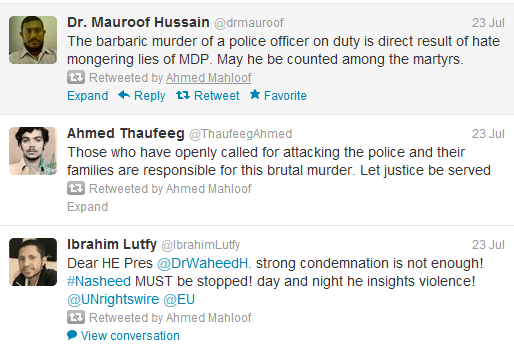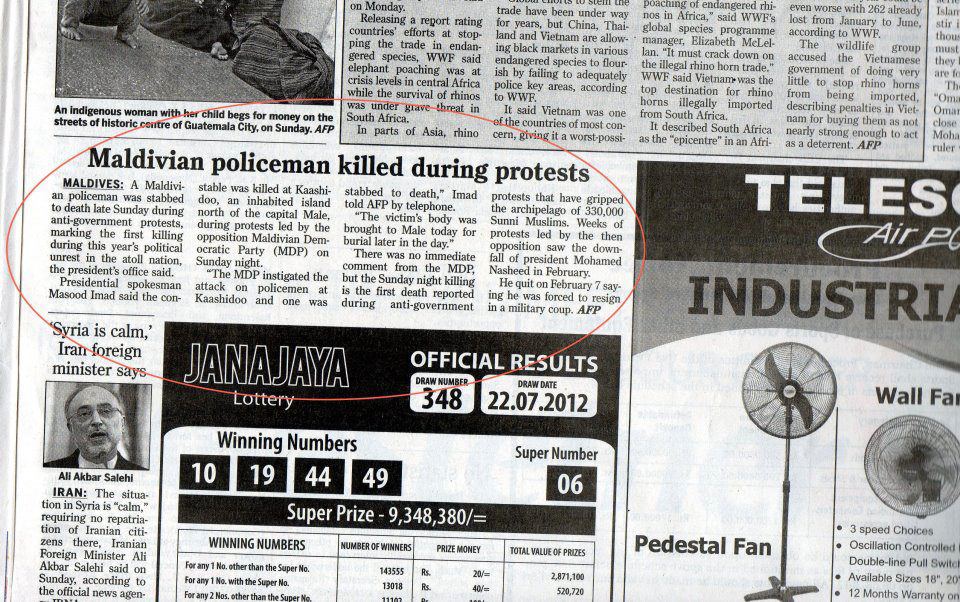The UN Human Rights Committee (UNHRC) has urged the Maldives to guarantee citizens’ right to democracy, permit freedom of religion, reform the Judicial Services Commission (JSC), abolish flogging and the death penalty, and deal with human trafficking, among other recommendations.
The Committee has issued concluding observations regarding the Maldives’ commitment to universal human rights, following the country’s defence of its record in Geneva on July 12-13.
The Maldivian delegation to the UNHRC was headed by Home Minister Dr Mohamed Jameel, a former Justice Minister during the 30 year rule of President Maumoon Abdul Gayoom and co-author of a pamphlet entitled ‘President Nasheed’s devious plot to destroy the Islamic faith of Maldivians’, published in January 2012.
Dr Jameel was accompanied by State Minister for Foreign Affairs, Dunya Maumoon – Gayoom’s daughter – as well as the Maldives’ Permanent Representative in Geneva, Iruthisham Adam.
Religion
A core concern of the committee involved the Maldives’ reservation to Article 18, concerning freedom of religion, the validity of which was questioned by the committee on the basis that it was “not specific, and does not make clear what obligations of human rights compliance the State party has or has not undertaken.”
Particular concerns included the tying of religion to citizenship, prompting the UNHRC to call on the country to revise its constitution, and abolish the crime of apostasy in legislation.
The committee also expressed concern about the clause in the constitution enabling the limitation of rights and freedoms “in order to protect and maintain the tenets of Islam”, challenging the broadness of the clause and warning that such a provision could be “invoked to justify the failure by the State party to fulfil its [human rights ] obligations”.
Concern was also raised about the criminalisation of homosexuality, and the “stigmatisation and marginalisation of homosexuals in [Maldivian] society”.
For its part, during its defence, the Maldives’ delegation stressed that the country was a homogeneous society and spoke one language and followed one religion, adding there was therefore no debate in Maldivian society regarding the removal of the provision relating to freedom of religion.
“This is not dogmatic government policy or preference, but rather a reflection of the deep societal belief that the Maldives always has been and always should be a 100 percent Muslim nation. Laws, like government, should be based on the will of the people,” Dunya told the panel.
Controversial transfer of power
The Committee noted in particular “the legal and political circumstances” under which the Feburary 7 transfer of power took place, and called on the government to ensure a citizen’s right to self determination – “ which lies at the core of democratic government based on the consent of the people.”
The report called on the Maldives to ensure that the Commission of National Inquiry was able to function “in conditions guaranteeing its complete independence and impartiality”, and called on the government “as a matter of urgency” to protect individuals who had provided information to the inquiry.
Torture inquiry commission
The UNHRC called for the government to establish an independent commission of inquiry to investigate “all human rights violations, including torture that took place in the State party prior to 2008 and provide compensation to the victims.”
The Committee should further investigate all allegations of torture that took place at the time of the demonstrations of February 8, 2012, in Malé and Addu, prosecute those responsible, and provide compensation and rehabilitation to the victims. The State party should implement the findings of the Commission of Inquiry set up to investigate events that took place during the political transition period.”
The committee also expressed concern at the composition of the police integrity commission, which was “hampering its independence”, and said it was concerned at the low number of cases relating to torture and ill-treatment received by the Commission as well as at the low number of police officers sanctioned.”
Legal reform
The composition and the functioning of the Judicial Services Commission (JSC) was “seriously compromised”, the UNHRC observed, a state of affairs which was affecting the independence of the judiciary “as well as its impartiality and integrity.”
“The Committee is concerned that such a situation undermines the judicial protection of human rights and fundamental freedoms in the Maldives,” the report stated, and called on the government to reform the JSC.
The UNHRC also called on the Maldives to abolish flogging and the death penalty.
Human trafficking
The committee expressed particular concern over reports relating to “trafficking in migrants from neighbouring countries for labour and sexual exploitation purposes.”
“No legislation has yet been enacted by the State party to prevent and protect against trafficking in persons. The Committee is further concerned at the lack of statistical data on the number of trafficked persons, the investigations conducted, the number of prosecutions and convictions, and the protective measures put in place, as well as the absence of a strategy to combat trafficking,” the Committee stated, calling on the government to study the root cause of the problem, provide data, punish traffickers, and provide protection to victims.
Domestic violence
Positive observations included the enactment of an Anti-Domestic Violence Act in April 2012, although the committee expressed concern at the low rate of complaints lodged for domestic violence, and at the lack of effective mechanisms of protection and rehabilitation for victims.
“The State party should take the necessary measures to implement fully the Domestic Violence Act. It should facilitate complaints from victims without fear of reprisals, intimidation or exclusion by the community; investigate, prosecute and punish those responsible with appropriate penalties; and provide compensation to victims. The State party should further establish a proper mechanism of protection, including by setting up shelters and by providing psychological rehabilitation and conduct awareness-raising campaigns on the negative impacts of domestic violence,” the report noted.
The Maldives is required to respond within one year detailing how it had implemented the Committee’s recommendations.

